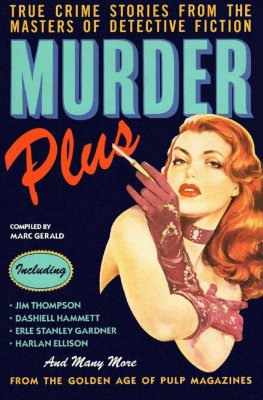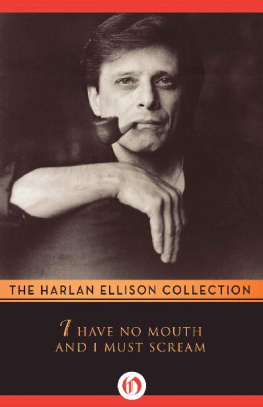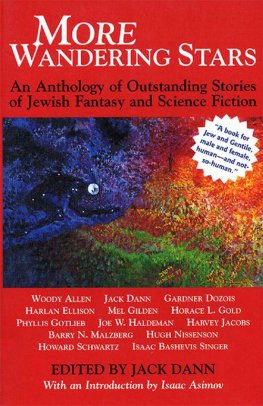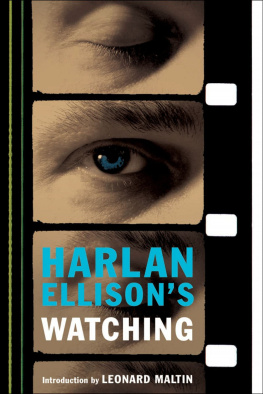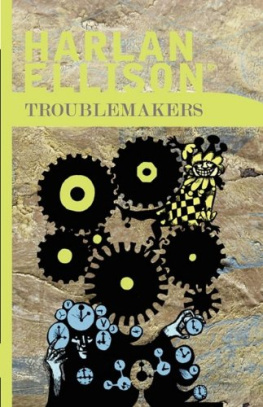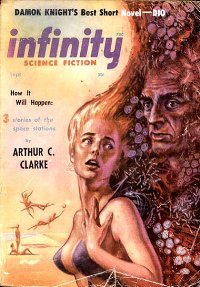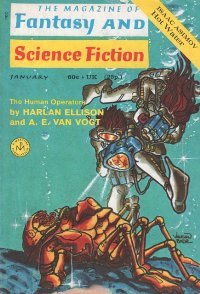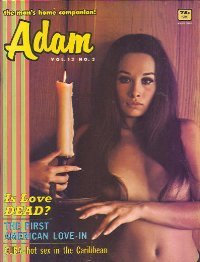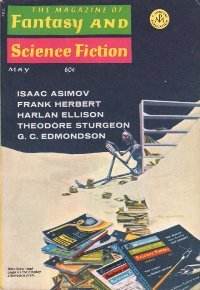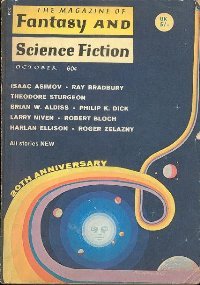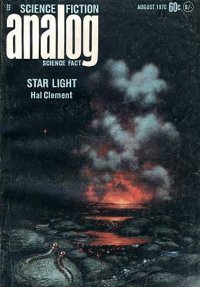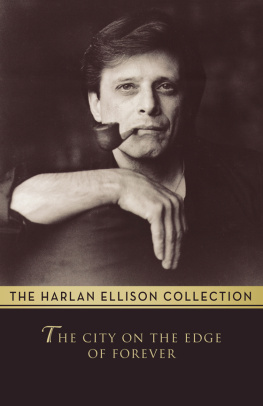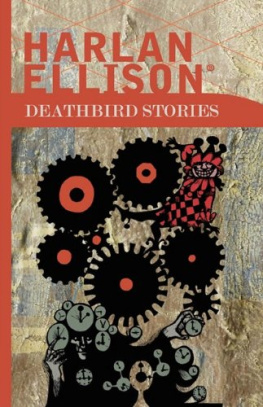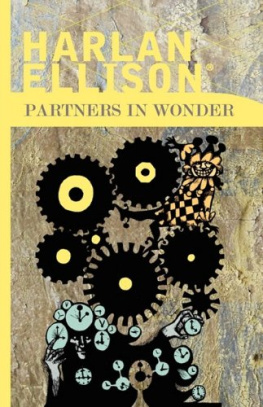
An Edge in My Voice
Essays
Harlan Ellison
ACKNOWLEDGMENTS
During the three years, off-and-on, that these columns were being batted out, many people provided assistance: some in small ways, as with reference or research efforts; some in large ways, as unnamed sources of information who preferred to be kept on deep background, or as messengers, delivering my copy to the offices of the L.A. Weekly in the small hours of the night when Id fall asleep over the typewriter. The proofreaders and typesetters at the Weekly who knew of my pathological desire to have the pieces published sans typos, who looked after the copy with special care. My office staff, who tossed an occasional grilled cheese sandwich at me as I labored. And most of all, the concerned readers whose suggestions as to subjects they wanted investigated or commented upon, who turned out for marches and at artistic events the column championedthose nameless dozens deserve my thanks. And yours.
But here are a few of the most important names, because they were invaluable: Sharon Buck, Ms. Marty Clark, Joanne Gutreimen, Barbara Krasnoff, Ed Naha, Stephanie OShaughnessy, Debra Spidell, Hank Stine, Sarah L. Wood and Bob Woods.
And very special thanks are herewith extended to Gil Lamont, Shelley Levinson and my two most significant editors, Kay Reynolds of Donning and Phil Tracy of the Weekly.
FOREWORD
BY TOM SNYDER
In SHATTERDAY, Harlan Ellison assured all of us that we share the same fears. That the one thing none of us have to be afraid of is admitting that we are afraid of the scary dreads that lurk inside us all. I have been sitting staring at the keys of this machine since three months ago. Then, Ellison asked if I would write a foreword to this book. A collection of more of his rantings and ravings that I first experienced very late one night on a defunct television program named Tomorrow. I liked Ellison then and I like him now. He honored me with his request. He flattered me. I accepted. And for three months I have been staring at the keys on this machine, in stark terror.
For years, I have written for television news programs. I think much of it has been pretty good, but if I set it down right here in front of you, few would remember a word of it. Thats because television news writing disappears rapidly. It comes on, it goes off, and it disappears. It doesnt lie around gathering shelf dust for years and then one rainy night beckon your curiosity from the book-table. I called Ellison three days ago and confessed to him I didnt have the foggiest notion of what a foreword to a book was all about. That I was terrified to think whatever words I strung together would be available for the jeering and ridicule of the audience forever. The good pieces I wrote for television would always be a private satisfaction to me. The dumb onesthe really horrid crap I had dashed out with no thought and less preparationthose were gone and forgotten and nobody would ever know of them and thank God for that. But here I was facing a foreword to a Harlan Ellison book.
Ellison has written forty-some books, won every award his peers can give him, has legions of fans around the world who hang on his every word as if they were struck in stone, and hehe who has taken to college lectures and Trekkie conventions so he will never again have to write for television because he hates it so deeplywants a television schlepas he loves to define usto write a foreword to his book. For me to write anything in the same book with Harlan Ellison makes about as much sense as having me hit tee shots for Jack Nicklaus. I confessed that to him, and he laughed and said to make believe the whole thing was writing a letter to a friend; simply to have fun.
I think Harlan Ellison has fun. Heres a little guy who every now and then drops into my life and points out that humans are the craziest people. We go absolutely nuts when New York State offers a winner $22,000,000 (thats right folks, twenty two million dollars) in a lottery. But New York State doesnt have the money to fix the highways and keep the bridges from falling down. Ellison has made me aware of things like thatthe great contradiction between what we are and what we think we are. I want to believe that most of us have had sufficient of the current diet of news slime: How a Kennedy really died; are Brooke Shields and Michael Jackson more than good friends; is Boy George really a boy; and so on and so on and so on until your brain cant stand it any longer. Ellison delights in cutting through all the smarm. He fights battles most of us havent even thought of, much less cared about. If you know anything of Frances Farmer, youll recall how she challenged everything hypocritical about God and Country. The so-called guardians of the public good cut her brain out to rid us all of cynicism and skepticism but it didnt work. Watching a movie about her reminded me of Harlan Ellison. He fights the wars that arent even worth fighting, and delights in our frustration when we finally figure it out. Guys like Harlan know we cant win em all, but we sure-as-shooting better win some, or else the guy who said, Lifes a bitch, and then you die!, will wind up being right.
The writer in the book follows. Along the way, youll hear him say that he wrote much of this a long time ago, and that when he asks you to write him about certain things, he meant for you to write him then, but that he doesnt want to hear from you now.
Hes just kidding.
Tom Snyder
29 May 84
TO THE MEMORY OF CHARLES BEAUMONT
2 JANUARY 192921 FEBRUARY 1967
A PRINCE FROM A FAR LAND
INTRODUCTION: Ominous Remarks for Late in the Evening
Both Hemingway and Scott Fitzgerald discovered a peculiar syndrome that affected critics of their work. They learned in the roughest way imaginable that if they were praised as great, fresh talents early on in their careers, that as they approached the middle years of writing they were reevaluated. The second guessers and the parvenus who could not, themselves, create the great and fresh stories, made their shaky reputations by means of pronunciamentos that advised those few literati who gave a damn, that les enfants terribles were now too long in the tooth to produce anything worth reading; that they were past it; and in the name of common decency should embarrass themselves no further by packing it in and retiring to the cultivation of Zen flower gardens. So they both croaked, and did the heavy deeds of assassination for their critics. But had they somehow managed to overcome cancer and alcoholism, had they managed to squeak through for another decade, theyd have found themselves lionized. Each would have made it through the shitrain to become le monstre sacr. Grand old men of letters. National treasures. Every last snippet theyd tapped out on yellow second-sheets sold at Sothebys for a pashas weight in rubies.
They never made it. Not rugged, spike-tough old Ernest, not lighter-than-air Scott. Time and gravity and the nibbling of minnows did them in. And so they dont know that they are still famousthough seldom readin the way that talk show guests are famous: you know their names and often their faces, but you cant quite remember what the hell it is they did to make them famous.





